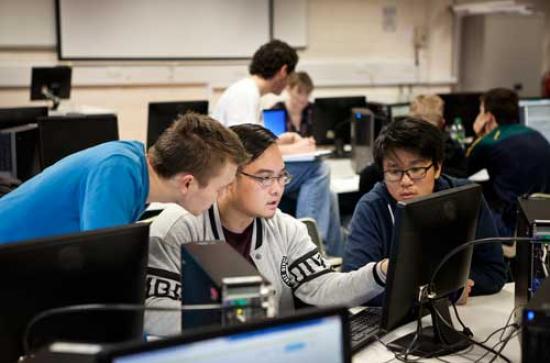
Migrant students are at risk of being left behind if no action is taken by Irish education policymakers, according to Dr Victoria Showunmi, Maynooth University Department of Education. Speaking ahead of the annual Maynooth Education Forum, Dr Showunmi called on Irish policymakers to learn from the experience of the United Kingdom over the past decades and do more to help integrate migrants.
Immigration is a relatively new phenomenon in Ireland. According to the most recent report conducted by the OECD, 10% of students in primary schools and about 8% of students in post-primary schools have immigrant backgrounds. Unlike most other OECD countries, first-generation immigrant students in Ireland were found to, on average, achieve education outcomes similar to their Irish-born peers.
However, the report acknowledged that migrants are a heterogenous group. There are now over 160 nationalities represented at post-primary level in Ireland, and migrants from non-white backgrounds have a different experience to white students who come to Ireland from abroad. The report also highlighted a gap in achievement between those students who speak English at home and those who did not.
Dr Showunmi points to the role the English language has played in the assimilation of migrants in the United Kingdom: “English language courses are considered an important part of the assimilation process, but many are unable to gain access to these classes due to availability issues or lack of resources. Providing access to opportunities is very different from stating that opportunities are available for all to take.”
One of the real lessons for Irish policy makers coming from the UK’s experience is the subtle difference between assimilation and integration. Assimilation is generally defined as adopting the ways of another culture and fully becoming part of a different society. On the other hand, integration is typically defined as incorporating individuals from different groups into society as equals.
“The onus is typically placed on the person coming into the country to assimilate, but many migrants feel that they lose part of their identity through this process. Those in charge of education policy should look to meet migrant students half-way by placing an emphasis on integration. The first step we can take in this case is to look at the content of the curriculum,” said Dr Showunmi.
The apparent challenges posed by curricula for those coming from a migrant background was highlighted in the UK recently by the “Why is My Curriculum White?” campaign. This student-led campaign was a response to the lack of diversity found on reading lists and course content.
“The curriculum needs to be developed to reflect the changing face of Ireland. An increasing proportion of young people are unable to see how what is being taught in schools and universities has any bearing on their experience or personal background. Integrating different viewpoints into the classroom is an important step to prevent this alienating experience that sours many young people on education.”
The Maynooth Education Forum is Ireland’s leading platform for the discussion of key issues facing education today. The fifth annual Forum brings together leading thinkers, practitioners, researchers, strategists, and policy makers from Ireland and overseas to discuss the experience of migrants in education. It will take place on Friday, 16 June, 2017 in the University.
Register to attend here.
